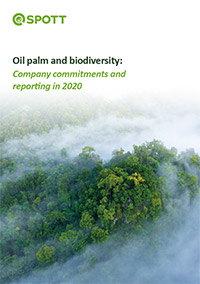Unsustainable palm oil production plays a significant role in biodiversity loss in tropical forests, and this must be a focus area for both the industry and its stakeholders to remedy. In order to do this, palm oil companies and their financiers and buyers must all inform themselves of the current state of commitments and efforts from upstream companies to tackle biodiversity loss, and where serious improvements are needed.
This new report from ZSL SPOTT draws on data from the 2020 SPOTT assessments of 100 palm oil producers, processors and traders, to provide an overview of their disclosure of commitments and progress on biodiversity protection. Findings indicate that although the majority of upstream palm oil companies assessed on SPOTT commit to protecting biodiversity, most fall short in reporting on implementation.
ZSL recommends a range of actions to better-protect biodiversity in oil palm landscapes. It is the responsibility of all actors involved – from the producer through to its downstream buyers, investors and lenders – to ensure clear and robust policies on protecting species and landscapes are in place as a first step, but then crucially, to ensure these are followed up with the implementation of concrete and effective actions on the ground.
We appeal to buyers and financial institutions, who are exposed to the Environmental, Social and Governance (ESG) risks of palm oil companies and can exercise considerable influence over their management, to:
- Quantify and disclose their palm oil exposure.
- Publish ESG commitments and implementation activities, and demand upstream supply chain actors to do the same.
- Incorporate biodiversity impact mitigation into all decision-making processes.

